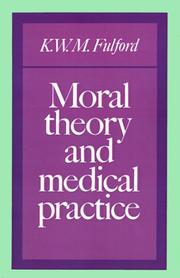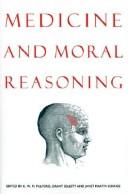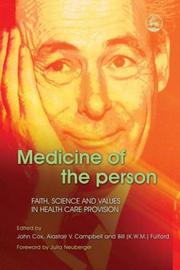| Listing 1 - 10 of 19 | << page >> |
Sort by
|

ISBN: 0521388694 0521259150 Year: 1989 Publisher: Cambridge New York Cambridge University Press
Abstract | Keywords | Export | Availability | Bookmark
 Loading...
Loading...Choose an application
- Reference Manager
- EndNote
- RefWorks (Direct export to RefWorks)
Professional ethics. Deontology --- Human medicine --- Ethics, Medical --- Philosophy, Medical --- Medical care --- Medical ethics --- Soins médicaux --- Ethique médicale --- Philosophy --- Philosophie --- Ethics, Medical. --- Philosophy, Medical. --- Medicine --- Medical ethics. --- Medical care.

ISBN: 0192628585 Year: 2000 Publisher: Oxford ; New York : Oxford University Press,
Abstract | Keywords | Export | Availability | Bookmark
 Loading...
Loading...Choose an application
- Reference Manager
- EndNote
- RefWorks (Direct export to RefWorks)
psychiatrie --- psychiatrische patient (geesteszieke) --- casus (gevalstudie, gevalsstudie, gevallenstudie, praktijkcase) --- ethiek (ethische aspecten) --- patient psychiatrique (malade mentale) --- étude de cas --- ethique (aspects ethiques) --- Psychiatric ethics. --- Case studies --- Psychiatric ethics --- Mental health services ethics --- Medical ethics

ISBN: 9780198526940 9780198526957 0198526946 0198526954 Year: 2006 Publisher: New York, N.Y. Oxford University Press
Abstract | Keywords | Export | Availability | Bookmark
 Loading...
Loading...Choose an application
- Reference Manager
- EndNote
- RefWorks (Direct export to RefWorks)
Mental health research and care in the twenty first century faces a series of conceptual and ethical challenges arising from unprecedented advances in the neurosciences, combined with radical cultural and organisational change. The Oxford Textbook of Philosophy of Psychiatry is aimed at all those responding to these challenges, from professionals in health and social care, managers, lawyers and policy makers; service users, informal carers and others in the voluntary sector; through to philosophers, neuroscientists and clinical researchers. Organised around a series of case studies in five key topic areas - concepts of disorder, the philosophical history of psychopathology, philosophy of science, ethics and philosophical value theory, and philosophy of mind - the book provides a detailed introduction to the field and a framework for study and skill development. Each case study is supported by selected readings from both philosophy and mental health, thinking skills exercises, self-test questions, key learning points and detailed guides to further reading. There is an introduction for philosophers to classification and descriptive psychopathology, and for practitioners to philosophical methods (including logic). The philosophical topics covered include philosophical methods (analytic and Continental); phenomenology, hermeneutics and existentialism, logical empiricism and its successors; idealism and realism; reasons and causes; and modern theories of mind and brain, free will and personal identity. Topics from mental health include psychiatry and 'anti-psychiatry'; Jaspers' psychopathology and the new neurosciences; the future of psychiatric classifications; strengths-based approaches, recovery practice, social inclusion and diversity; and key topics in psychopathology, such as delusion, autism, disorders of volition, thought insertion and other experiences in schizophrenia. The Oxford Textbook of Philosophy of Psychiatry aims to secure the skills-base of the
Psychiatry --- Philosophy of science --- Mental illness --- Psychiatry. --- Mental Disorders. --- Philosophy.

ISBN: 052145946X 0521436931 0521453259 051162784X Year: 1994 Publisher: Cambridge New York, NY, USA Cambridge University Press
Abstract | Keywords | Export | Availability | Bookmark
 Loading...
Loading...Choose an application
- Reference Manager
- EndNote
- RefWorks (Direct export to RefWorks)
This collection examines prevalent assumptions in moral reasoning which are often accepted uncritically in medical ethics. It introduces a range of perspectives from philosophy and medicine on the nature of moral reasoning and relates these to illustrative problems, such as New Reproductive Technologies, the treatment of sick children, the assessment of quality of life, genetics, involuntary psychiatric treatment and abortion. In each case, the contributors address the nature and worth of the moral theories involved in discussions of the relevant issues, and focus on the types of reasoning which are employed. 'Medical ethics is in danger of becoming a subject kept afloat by a series of platitudes about respect for persons or the importance of autonomy. This book is a bold and imaginative attempt to break away from such rhetoric into genuine informative dialogue between philosophers and doctors, with no search after consensus.' Mary Warnock
Biologie humaine -- Morale et aspects éthiques --- Biomedical ethics --- Biomedische ethiek --- Biomédecine -- Morale et aspects éthiques --- Deontologie [Medische ] --- Deontology [Medical ] --- Déontologie médicale --- Ethics [Medical ] --- Ethiek [Medische ] --- Ethique médicale --- Judgment (Ethics) --- Jugement (Ethique) --- Jugement moral --- Medical care -- Moral and ethical aspects --- Medical deontology --- Medical ethics --- Medicine -- Moral and ethical aspects --- Medische deontologie --- Medische ethiek --- Moral judgement --- Morale et médecine --- Morale médicale --- Moreel oordeel --- Médecine -- Innovations -- Morale et aspects éthiques --- Médecine -- Morale et aspects éthiques --- Médecine et morale --- Oordeel (Ethiek) --- Politique sanitaire -- Morale et aspects éthiques --- Soins médicaux -- Morale et aspects éthiques --- Éthique clinique --- Medical ethics. --- Ethics, Medical. --- Morals. --- Morality --- Retrospective Moral Judgment --- Medical Ethics --- Medicine --- Professionalism --- Bioethics --- Moral judgment --- Ethics --- Clinical ethics --- Ethics, Medical --- Health care ethics --- Medical care --- Professional ethics --- Nursing ethics --- Social medicine --- ethics --- Moral and ethical aspects --- Judgment (Ethics). --- Morals --- Judgement (Ethics) --- Arts and Humanities --- Philosophy

ISBN: 019852613X 9780198526131 Year: 2007 Publisher: Oxford ; New York : Oxford University Press,
Abstract | Keywords | Export | Availability | Bookmark
 Loading...
Loading...Choose an application
- Reference Manager
- EndNote
- RefWorks (Direct export to RefWorks)
Schizophrenia arguably is the most troubling, puzzling, and complex mental illness. No single discipline is equipped to understand it. Though schizophrenia has been investigated predominately from psychological, psychiatric and neurobiological perspectives, few attempts have been made to apply the tool kit of philosophy to schizophrenia, the mix of global analysis, conceptual insight, and argumentative clarity that is indicative of a philosophical perspective.This book is a major effort at redressing that imbalance. Recent developments in the area of philosophy known as the philosophy of psych
Delusions --- Schizophrenia. --- Schizophrenic Psychology. --- psychology. --- Schizophrénie --- Schizophrenia --- Dementia praecox --- Schizophrenic disorders --- Psychoses --- Schizotypal personality disorder
Book
ISBN: 0198732368 0191750905 9780191750908 Year: 2014 Publisher: [New York, N.Y.] Oxford University Press
Abstract | Keywords | Export | Availability | Bookmark
 Loading...
Loading...Choose an application
- Reference Manager
- EndNote
- RefWorks (Direct export to RefWorks)
The Oxford Handbook of Psychiatric Ethics (the OHPE) examines ethical issues in twenty-first-century psychiatry and sets them in their social and political context. Key contextual developments for contemporary psychiatry include the rapid expansion of electronic communications, multiculturalism, new models of service delivery and new technologies, more oversight within stronger standards-based regulatory frameworks, and the emergence of more clinically embedded forms of practical ethics. These developments are reflected in the wide range and diversity of contributions to the OHPE. In addition to well-established areas of scholarship our contributors cover a variety of new and emerging topics: notable among these are peer support, co-production and other collaborative models of care, recovery, spiritual and religious aspects of psychiatry, non-European philosophy, and the emerging role of values-based practice. Diversity of content is further complemented by the diversity of perspectives represented by our contributors. Besides established figures in psychiatric ethics our authors include many new contributors to the field from disciplines representing both expertise-by-training (in areas ranging from philosophy to neuroscience) and expertise-by-experience as service users and/or as carers. The central importance of this latter perspective is reflected in our opening main section which brings together a small sample of the rapidly expanding expert voices from experience. We hope that read in conjunction with its sister volume, the Oxford Handbook of Philosophy and Psychiatry, and other books forthcoming in the series, the OHPE will contribute to the development of more collaborative models of service delivery as the basis of twenty-first-century mental health care.
Psychiatry --- Moral and ethical aspects. --- Medicine and psychology --- Mental health --- Psychology, Pathological --- Psychiatric ethics --- Mental health services ethics --- Medical ethics
Book
ISBN: 2704015856 9782704015856 Year: 2017 Publisher: Montrouge
Abstract | Keywords | Export | Availability | Bookmark
 Loading...
Loading...Choose an application
- Reference Manager
- EndNote
- RefWorks (Direct export to RefWorks)
Une pratique clinique nouvelle centrée sur les ressources de la personne soignée, de ses proches et des équipes soignantes.
Personalized medicine. --- Values --- Philosophy. --- Axiology --- Worth --- Aesthetics --- Knowledge, Theory of --- Metaphysics --- Psychology --- Ethics --- Individualized medicine --- Medical care --- Pharmacogenetics --- Precision medicine. --- Personalized medicine

ISBN: 019175434X 1283580306 9786613892751 0191588938 9780191588938 019852613X Year: 2007 Publisher: Oxford ; New York : Oxford University Press,
Abstract | Keywords | Export | Availability | Bookmark
 Loading...
Loading...Choose an application
- Reference Manager
- EndNote
- RefWorks (Direct export to RefWorks)
Schizophrenia arguably is the most troubling, puzzling, and complex mental illness. No single discipline is equipped to understand it. Though schizophrenia has been investigated predominately from psychological, psychiatric and neurobiological perspectives, few attempts have been made to apply the tool kit of philosophy to schizophrenia, the mix of global analysis, conceptual insight, and argumentative clarity that is indicative of a philosophical perspective.This book is a major effort at redressing that imbalance. Recent developments in the area of philosophy known as the philosophy of psych
Schizophrenia. --- Psychology. --- Behavioral sciences --- Mental philosophy --- Mind --- Science, Mental --- Human biology --- Philosophy --- Soul --- Mental health --- Dementia praecox --- Schizophrenic disorders --- Psychoses --- Schizotypal personality disorder

ISBN: 1280929383 9786610929382 1846425506 9781846425509 9781280929380 1843103974 9781843103974 Year: 2007 Publisher: London Philadelphia Jessica Kingsley
Abstract | Keywords | Export | Availability | Bookmark
 Loading...
Loading...Choose an application
- Reference Manager
- EndNote
- RefWorks (Direct export to RefWorks)
Informed by the principle of 'medicine of the person', the contributors argue for a medical practice which takes account of spirituality, ethics and theology in keeping with the ideas and beliefs of Paul Tournier, an influential Swiss GP whose thinking has had a substantial impact on routine patient care relevant to national health services.
Medical care --- Medical care. --- Medical ethics. --- Medicine --- Value. --- Standard of value --- Cost --- Economics --- Exchange --- Wealth --- Prices --- Supply and demand --- Health Workforce --- Biomedical ethics --- Clinical ethics --- Ethics, Medical --- Health care ethics --- Bioethics --- Professional ethics --- Nursing ethics --- Social medicine --- Delivery of health care --- Delivery of medical care --- Health care --- Health care delivery --- Health services --- Healthcare --- Medical and health care industry --- Medical services --- Personal health services --- Public health --- Religious aspects. --- Philosophy. --- Moral and ethical aspects --- Science.
Book
ISBN: 9780199663880 9780198732365 9780198732372 Year: 2015 Publisher: Oxford Oxford University Press
Abstract | Keywords | Export | Availability | Bookmark
 Loading...
Loading...Choose an application
- Reference Manager
- EndNote
- RefWorks (Direct export to RefWorks)
Psychiatrists have written much about the explosive expansion of scientific knowledge of the brain which developed over the late 20th century and the early 21st century. Comparatively little has been written within the field of psychiatry about the changes in society and world culture over this same period, and even less on the scope of psychiatric ethics that would account for these changes. Yet psychiatric ethics is an excellent framework in which to examine social changes in the field over the past 25 years, changes which are dramatic in nature and profound in impact.0Some of these social changes include multiculturalism and its associated diversity of values; the transition to the digital era with its new demands on confidentiality, clinical boundaries, and privacy; the empowerment of psychiatric service users as full participants and co-producers of care; the development of new technologies of assessment and treatment, varying in their invasiveness and risk; the recognition of expanded social roles for psychiatrists, and the associated virtues of psychiatric citizenship; and the development of new practice models, settings, participants, and oversight, all of which represent profound challenges and opportunities for the ethical practice of psychiatry. The 'Oxford Handbook of Psychiatric Ethics' is the most comprehensive treatment of the field in history.
Professional ethics. Deontology --- Psychiatry --- Medizinische Ethik. --- Psychiatric ethics. --- Psychiatrie. --- Psychische Störung. --- Ethics.
| Listing 1 - 10 of 19 | << page >> |
Sort by
|

 Search
Search Feedback
Feedback About UniCat
About UniCat  Help
Help News
News